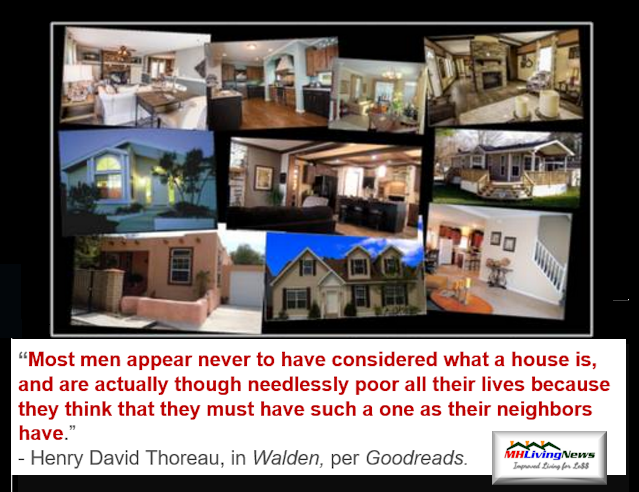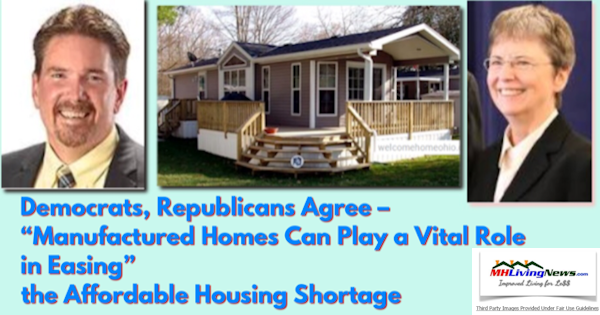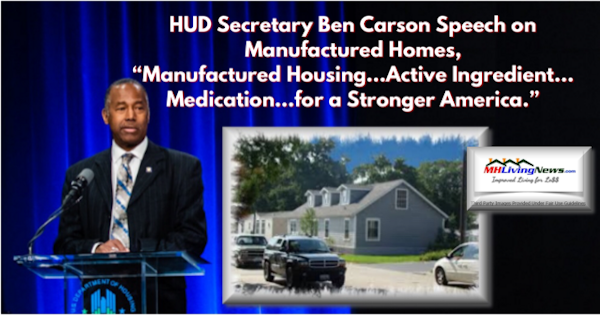We’ve done several serious reports in the last year or so that look deeper behind the often dark curtain to understand why manufactured homes – along with the mobile homes and trailer houses that preceded them – are so misunderstood.
Today will be a bit different.
43 years ago, today is the official “birth” of HUD Code manufactured homes. Before June 15, 1976, there were trailer houses built in the 1930s and following. A trailer house could be pulled by a car or pickup with the proper equipment.
By the 1950s, the mobile home era started. Homes were built that were too large, long, or heavy to be pulled by a car or pickup truck. Commercial vehicles with trained drivers were needed by law in many states in order to pull a mobile home. They still may have only been 8’ wide but longer, or later came 10’, 12’, or later 14’ wides and ‘double wides’ that were made up of two sections transported separately, but mated together on site.
Homeowner interviews like this one by MHLivingNews provided
no incentive or rewards to those being interviewed.
While our firm has clients and sponsors, these interviews
accurately reflect the views of those who freely
decided to share their comments so that more
understand modern manufactured homes. Homeowners like
this couple routinely talk about doing comparison shopping.
We recommend that consumers do their homework before
buying any kind of housing.
By the late 1960s and the early 1970s, several developments occurred that tipped the industry’s thought leaders into action. They decided to work for proper federal regulation of the industry. While most mobile homes built during that timeframe were arguably fine by contemporary standards, often made to ANSI or UL inspected standards, some builders constructed products that frankly did pose safety or other problems. It was those problematic types of ‘mobile homes that sparked 60 Minutes and other mainstream media reported on certain brands of mobile homes. That fueled the desire for proper federal regulation to address the root issues.
In 1974, the U.S. Congress passed the National Manufactured Housing Construction and Safety Standards Act. That authorized the Department of Housing and Urban Development to establish construction standards for manufactured homes. It became the first, and still only, federal building code for housing.
Notice that Congress essentially changed the terminology, from ‘mobile homes’ or ‘trailer houses’ to manufactured homes and ‘manufactured housing.’ The reason is because there were standards put in place that insured to home buyers that necessary safety, energy, and construction durability were assured in every HUD Code manufactured home. So those who think the terminology is a marketing move are mistaken. Not many savvy marketers would have used the harder to express term selected.
That 1974 federal act went into effect on June 15, 1976. So, that was 43 years ago today. That National Manufactured Housing Construction and Safety Standards Act established standards effectively brought to a close the trailer house and mobile home construction era.
While too many still use those terms with respect to manufactured homes, there are construction, safety, energy, and legal standard distinctions. You should not call a car a boat. You don’t refer to a boat as an airplane. A condo is different than a single-family ranch. Words have specific meanings.

It should be noted that the RVs – Recreational Vehicles, some of which are towable and others are motorized – differ from trailer houses and mobile homes. As their name implies, a RV is usually used for getaways. True, some RVs are made for more full-time living. But contrasted to trailer houses, those trailer homes in the 1930s to the 1950s were made for dwelling, not recreational, purposes. The 1939 Schult home shown in the video above reflects the residential intent of that house.
The mixing of terminology is therefore flawed for many reasons, some of which includes the fact that calling a manufactured home a trailer house is viewed by many as an insult or put down.
There are voices on either side of the left-right divide that have mistakenly misused terminology. It will take time, persistence, and patience to change that, just as it took time to get millions to stop using the N word with respect to African Americans. That said, some people weaponize terminology for their own shock tactics, distraction efforts, or other reasons.

That said, in hindsight, it is not a political comment to note that the phrase used below ought to be condemned by all people of good will.

There is an increasing interest in the proper understanding, respect, and appreciation for manufactured homes. We hear from local, state, as well as federal officials, their staffs and of course, the general public that they are grasping the value of modern manufactured homes.
MHLivingNews routinely spotlights bipartisan or nonpartisan promotion of manufactured homes as an important part of the solution to the affordable housing crisis.
For millions, what they personally need, want, and care about is what they will decide to do. Reports like this are meant to help in that discernment process.
The thumbnail history should not be construed that we or anyone else ought to put down the trailer houses or mobile homes of decades ago. Society, products, and services evolve over time.


Without the old crank phones, which led later to rotary dialed phones, and then finally touch-tone phones would not have existed. We treasure old crank phones as reminders of that evolution. Without old bag phones, we wouldn’t have modern cell phones or smart phones. Old car shows celebrate “antique” vehicles. Why don’t we similarly treasure the trailer houses and mobile homes of the past in that same manner?
In my mind’s eye, I can picture a couple who had a mobile home made by Detroiter. It was adorable. They kept it up nicely, just as millions of others have their homes. It was a ‘front kitchen’ model, with 2 bedrooms and one bath. It was about 700 square feet. Next door on the same acreage was the home of one of their sons, which was a larger and newer HUD Code manufactured homes that was about 1,038 square feet. They each valued, enjoyed, and appreciated their homes. Each did various add-ons to personalize their dwelling.
The numerous video interviews we’ve done through the years with home owners, experts, public officials, and others reveal that the majority we speak to or meet with love their homes. Third-party surveys suggest the same thing. Federal data reports that only a tiny fraction – less than ¼ of 1 percent – of new manufactured homes ever go to HUD’s Dispute Resolution program. It’s an impressive record.
What We Are Critical Of in MHVille…
We are critical of the Manufactured Housing Institute (MHI) on several levels. One is that they arguably have failed in various ways the millions of mobile and manufactured homeowners, and tens of thousands of independents businesses.
In reading reports, watching videos, and speaking to federal officials, we’re hearing more concerns being raised about specific companies in manufactured housing. But that is to be held distinct from the majority of good operations that exist. Don’t let a bad apple keep you from the good ones.
That said, our sources tell us that a few MHI members essentially pushed MHI into involvement in the recent Innovations in Housing Showcase (IHS2019) on the National Mall in Washington, D.C. on June 1-5, 2019. MHI had little choice but to make videos of the occasion. They have not yet promoted these fine videos like we believe they merit. That too is indirect evidence that these are fig leaves, not a serious effort to promote the industry – even though it could or should be.
For pushing MHI into these videos, those companies involved – in our view – deserve favorable mention.
Now let’s see if those same firms can or will nudge MHI into actually educating the public on the truth of manufactured homes, and stop playing games like those alleged in the report linked here. Let’s see if they will get MHI to promote these videos, which have as of the date and time shown below, only had modest numbers of viewers.
If MHI were doing their job properly, it is reasonable to believe that millions of more Americans would have an accurate view of the history of factory-built housing. That in turn would mean that millions of more Americans would be building equity by owning a manufactured home, instead of tossing out money on rent receipts. While it makes sense for some to rent for a time, there are reams of research that reveal that value of paying for the home that you live in as a path to greater wealth.
If MHI were doing their job properly, they would also not put out information that is at times inaccurate, problematic, agenda-driven, weaponized, and makes hypocritical claims. Who says such things about MHI? Some of their own past and current members have said so publicly. MHI’s own former president in his exit message to the industry, de facto delivered a series of thinly veiled slaps, as that MHI leader said in his own words, at this link here.
That said, these fine MHI videos are an apt example of separation of wheat from chaff. Wheat can be consumed by most people. But chaff is inedible for humanity and should be tossed aside for other more fitting uses. We strive day-by-day to separate the good – the wheat – from the problematic – the chaff – here on MHLivingNews or on our professional and investor focused site. We do so as experts that know a lot, but don’t claim to know everything; no one does.
When MHI Chairman Joe Stegmayer says that manufactured housing is ‘so much of an untold story‘ in this video below, who is responsible for that point? Stegmayer has brought a measure of controversy to his company and MHI when the SEC issued a subpoena to him and Cavco and has sparked several investigations by plaintiff’s shareholders. These are among the reasons why some are arguably leary.
But a deeper look at the evidence reflects that the problematic companies can routinely be bypassed for ‘white hat’ firms.
We believe that manufactured homes – and the mobile or trailer homes that came before them – ought to be embraced as an important part of the solution to the affordable housing crisis. That’s done not solely with pretty pictures, 3D mimicking tech, or slick videos – as nice as those may be. Rather, it is done by debunking mistakes and sharing evidence-based and factual-truths. While we disagree with Tim Williams on some of their business practices, like those linked here, we do agree with his statement, made below. Wheat and chaff.

When someone understands that manufactured homes have successfully built upon the history of the past, and that by law, they must perform to the same types of standards that conventional housing does, that should give confidence to buyers, developers, public officials, media, and all others.
Former HUD Secretary Julian Castro had nice things to say about manufactured homes in this video below.
That noted, to date, no one in the 21st century has done more than HUD Secretary Ben Carson has to promote the proper understanding of manufactured housing. The IHS2019 is a profound example of that claim.
About Secretary Carson, One More Thing…
There is one more point to make. HUD Secretary Carson, per our federal sources, has not been briefed on the enhanced preemption provision of the Manufactured Housing Improvement Act of 2000. We’ve been told that by Democrats and Republicans working on Capitol Hill. When asked about that specific concern, numbers of HUD’s officials have declined to comment on that claim. If that claim is true, and there is growing evidence to that effect, that needs to be corrected. Because NIMBYism could be rapidly overcome by applying the law, as the Rev. Tye and others have pointed out. See a report, linked here.
Affordable housing should not be a political tug of war. Just as Minnesota lawmakers found common ground in celebrating the good news about manufactured homes, we believe that manufactured housing must be broadly and widely made available in all 50 states.

Helping more Americans understand the facts get beyond fears to facts will speed that process. That also means that consumers must be able to discern the distinction between good companies – so called ‘white hats’ operating in manufactured housing – vs. those that cause problematic headlines and headaches for consumers. Bad news about housing related scandals can happen with every type of construction, as the mainstream news media video in the report linked below reminds readers.

The good news is that with some reasonable homework, including here on MHLivingNews, it can help make clear who those white hats and black hats are.
Happy 43rd Anniversary to the HUD Code manufactured home industry. May there be decades more to come. These are homes that when properly understood can and do solve the affordable housing needs of those who grasp and follow this misunderstood option. “We Provide, You Decide.” © ## (Lifestyle news, commentary, fact-checks, and analysis.)

L. A. ‘Tony’ Kovach is co-founder of MHLivingNews, MHProNews, is a highly acclaimed industry consultant, a managing member of LifeStyle Factory Homes, LLC, and is a 25 plus year award-winning manufactured home industry professional. Kovach earned the Lottinville award in history at the University of Oklahoma.
Related Reports:
Click on the hot-linked text-image boxes below to learn more.


 manufacturedhomelivingnews.com Manufactured Home Living News
manufacturedhomelivingnews.com Manufactured Home Living News


































